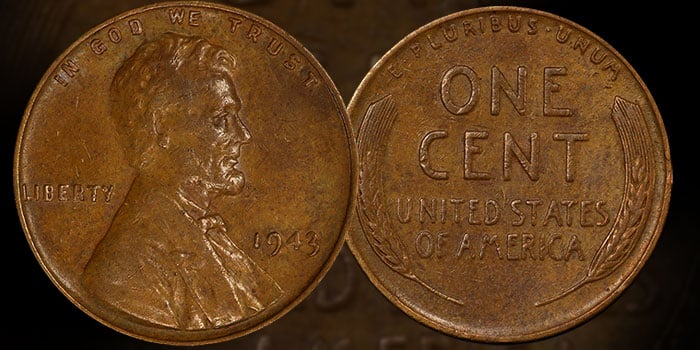Lincoln Wheat Penny — 1943 Bronze Error
Overview
In 1943, the U.S. Mint switched from copper to zinc-coated steel for Lincoln cents to conserve copper for World War II. A tiny number of bronze (copper) planchets were accidentally struck with the 1943 dies—creating one of the most famous U.S. error coins. These pieces look like normal copper pennies rather than gray steel.
Rarity
Only a small handful of 1943 bronze cents are known from Philadelphia, Denver, and San Francisco. Each discovery makes headlines. Because the mintage error is so limited, authenticated examples are coveted by collectors and investors.
Value
Prices vary widely with grade, mint mark, and market demand. Verified 1943 bronze cents in circulated grades have sold for five to six figures, while exceptional certified examples have realized hundreds of thousands—and in top condition, even crossed the million‑dollar mark at auction.
| Condition | Estimated Value Range* |
|---|---|
| Worn (circulated) | $50,000 – $150,000 |
| Fine to Extremely Fine | $125,000 – $300,000 |
| About Uncirculated | $250,000 – $600,000 |
| Mint State (certified) | $600,000 – $1,000,000+ |
*Illustrative ranges based on public auction history and expert dealer observations. Actual results depend on precise grade, eye appeal, and authentication.
Circulation
Stories of people finding treasure in spare change persist—and with good reason. While the odds are tiny, genuine discoveries have surfaced from collections, piggy banks, and mixed coin lots. Most 1943 cents you’ll encounter are steel; a bronze piece stands out by color, weight, and behavior near a magnet.
- Magnet test: Steel sticks; bronze doesn’t.
- Weight test: Bronze ~3.11g; steel ~2.7g.
- Color: Bronze looks coppery; steel is gray (often zinc-toned).
Collecting
If you suspect a 1943 copper cent, handle it carefully by the edges and avoid cleaning. Photograph it in natural light and compare with known diagnostics. For serious candidates, submit to PCGS or NGC for authentication and grading.
- No magnetic attraction.
- Weight close to 3.11g on a digital scale.
- Normal 1943 style (not a 1948 altered to “3”).
- Healthy, original surfaces (never polished).
Even if yours turns out to be steel, coin hunting is a fun, inexpensive hobby—especially with Lincoln cents. You might learn grading, spot minor varieties, and build a collection on a modest budget.

Leave a Reply